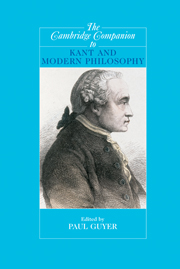Book contents
- Frontmatter
- Introduction: The starry heavens and the moral law
- 1 “A Priori”
- 2 Kant on the perception of space (and time)
- 3 Kant’s philosophy of mathematics
- 4 Kant on a priori concepts: The metaphysical deduction of the categories
- 5 Kant’s philosophy of the cognitive mind
- 6 Kant’s proofs of substance and causation
- 7 Kant and transcendental arguments
- 8 The critique of metaphysics: The structure and fate of Kant’s dialectic
- 9 Philosophy of natural science
- 10 The supreme principle of morality
- 11 Kant on freedom of the will
- 12 Mine and thine? The Kantian state
- 13 Kant on sex and marriage right
- 14 Kant’s theory of peace
- 15 Kant’s conception of virtue
- 16 Kant’s ambitions in the third Critique
- 17 Moral faith and the highest good
- 18 Kant’s critical philosophy and its reception - the first five years (1781-1786)
- Bibliography
- Index
10 - The supreme principle of morality
Published online by Cambridge University Press: 28 March 2007
- Frontmatter
- Introduction: The starry heavens and the moral law
- 1 “A Priori”
- 2 Kant on the perception of space (and time)
- 3 Kant’s philosophy of mathematics
- 4 Kant on a priori concepts: The metaphysical deduction of the categories
- 5 Kant’s philosophy of the cognitive mind
- 6 Kant’s proofs of substance and causation
- 7 Kant and transcendental arguments
- 8 The critique of metaphysics: The structure and fate of Kant’s dialectic
- 9 Philosophy of natural science
- 10 The supreme principle of morality
- 11 Kant on freedom of the will
- 12 Mine and thine? The Kantian state
- 13 Kant on sex and marriage right
- 14 Kant’s theory of peace
- 15 Kant’s conception of virtue
- 16 Kant’s ambitions in the third Critique
- 17 Moral faith and the highest good
- 18 Kant’s critical philosophy and its reception - the first five years (1781-1786)
- Bibliography
- Index
Summary
WHAT IS ”THE SUPREME PRINCIPLE OF MORALITY”?
In the Preface to his best known work on moral philosophy, Kant states his purpose very clearly and succinctly: “The present groundwork is, however, nothing more than the search for and establishment of the supreme principle of morality, which already constitutes an enterprise whole in its aim and to be separated from every other moral investigation” (Groundwork, 4:392). This paper will deal with the outcome of the first part of this task, namely, Kant's attempt to formulate the supreme principle of morality, which is the intended outcome of the search. It will consider this formulation in the light of Kant's conception of the historical antecedents of his attempt.
Our first task, however, must be to say a little about the meaning of the term “supreme principle of morality.” For it is not nearly as evident to many as it was to Kant that there is such a thing at all. And it is extremely common for people, whatever position they may take on this issue, to misunderstand what a “supreme principle of morality” is, what it is for, and what role it is supposed to play in moral theorizing and moral reasoning. Kant never directly presents any argument that there must be such a principle, but he does articulate several considerations that would seem to justify supposing that there is. Kant holds that moral questions are to be decided by reason. Reason, according to Kant, always seeks unity under principles, and ultimately, systematic unity under the fewest possible number of principles (Pure Reason, A 298-302/B 355-9, A 645-50/B 673-8).
- Type
- Chapter
- Information
- The Cambridge Companion to Kant and Modern Philosophy , pp. 342 - 380Publisher: Cambridge University PressPrint publication year: 2006
- 13
- Cited by



